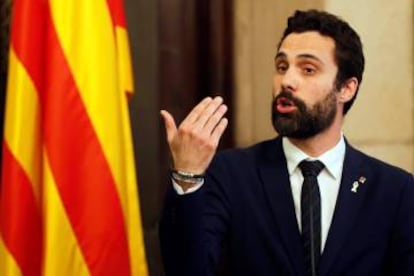Court battles and deadlock: In Catalonia, a familiar situation unfolds
Spanish tribunal suspends reform allowing Carles Puigdemont to be remotely sworn in, while support for direct rule wavers

The Spanish Constitutional Court on Wednesday suspended a recent legislative reform in Catalonia allowing regional premiers to be remotely sworn in.
The separatist majority in the Catalan parliament had fast-tracked the reform’s passage in order to allow Carles Puigdemont – the ousted leader who is currently in Germany awaiting an extradition decision – to bid for the post again.
Catalonia held a snap election last December, but no government has emerged yet and a situation of deadlock is continuing. After three failed nominations, the region faces a fresh election if a new leader is not found by May 22.
If the Catalan parliament allows Puigdemont to be sworn in, the house speaker will be incurring in an act of disobedience
The reform seeks to eliminate the requirement for candidates to physically attend the investiture debate in parliament before being voted in. It also allows Catalan executive bodies to meet outside Spain.
The reform, which passed in a 70-64 vote, was described by the opposition as “tailor-made” for Puigdemont. Shortly after the December election, Puigdemont had unsuccessfully attempted to get himself reappointed from Belgium, where he fled to avoid rebellion charges in Spain over the breakaway attempt.
The central government of Spain immediately appealed before the Constitutional Court, which has placed the new legislation on hold while it considers its constitutionality. State lawyers described the reform as “altering the rules of the game of parliamentary life at a crucial moment” with the goal of applying it to “a specific case.”

The suspension means that if the Catalan parliament still goes ahead and allows Puigdemont to be remotely sworn in, House Speaker Roger Torrent and other members of the chamber’s governing board (the Mesa) will be incurring in an act of disobedience.
The Popular Party (PP) executive has also made a renewed appeal for Catalan separatists to come up with a “viable” candidate who is not in trouble with the law, unlike the three nominees who have stepped forward so far: Puigdemont, Jordi Sànchez and Jordi Turull.
The Mariano Rajoy administration is anxious to end its emergency rule over the region and hand power back to a new Catalan government. Madrid had been expecting this to happen soon after the snap election that it called in December.
But the separatist majority that emerged from that vote has been backing nominees who face prosecution for their roles in the breakaway push, and who are either fugitives living outside Spain (Puigdemont) or in preventive prison (Sànchez and Turull).
Article 155
Making matters worse for Rajoy, Ciudadanos has announced that it is withdrawing its support for Article 155, the constitutional provision that allowed Madrid to temporarily revoke home rule in Catalonia.
The center-right party, which was born in Catalonia to represent non-separatist Catalans and has since become the fourth-largest force in Spanish Congress, justified its decision on “an accumulation of factors in the way that the intervention in Catalonia has been carried out.”
“This is as far as we go,” said Ciudadanos leader Albert Rivera in the hallways of Congress on Wednesday.
A police exodus
Officers with Spain's National Police don't want to get sent to Catalonia. The latest round of hiring by the Interior Ministry offered hundreds of positions across Spain, including around 500 in Catalonia. Only 20 of these have been filled.
In the meantime, nearly 260 officers currently stationed there – representing close to 10% of the total – have asked to be transferred elsewhere.
A ministry spokesman said that this drop will soon be made up for with a new contingent of officers who will be sworn into their posts in June.
Ramón Cosío, spokesman for the police union SUP, talks about "an exodus" and blames most of it on "the new social situation created by the procés [the pro-independence movement]."
Ciudadanos is particularly disappointed that the Rajoy administration did not take the opportunity granted by Article 155 to enforce a legal quota of classes in the Spanish language for Catalan schoolchildren, a requirement that nationalist governments have largely ignored citing the benefits of “language immersion” in Catalan.
The unionist party also feels that the central administration has not shown enough support for members of the Civil Guard stationed in Catalonia and whose children were reportedly harassed at school by teachers following the October 1 referendum.
The government sees this move by Ciudadanos as “disloyal” and a result of its good showing in voting intention polls. The main opposition Socialists (PSOE), who also supported the takeover of Catalan affairs, criticized Ciudadanos for “lacking a sense of state.”
“The PSOE is very critical of the government on many issues,” said the party’s congressional spokeswoman, Margarita Robles. “But on matters like counter-terrorism and territorial issues we have backed the government, not because it is the government but because those are policies of state.”
The breakup does not affect the application of Article 155, which will remain in place until a new Catalan government emerges. Sources at the executive said they still hope that this will happen within the next 10 days.
English version by Susana Urra.
Tu suscripción se está usando en otro dispositivo
¿Quieres añadir otro usuario a tu suscripción?
Si continúas leyendo en este dispositivo, no se podrá leer en el otro.
FlechaTu suscripción se está usando en otro dispositivo y solo puedes acceder a EL PAÍS desde un dispositivo a la vez.
Si quieres compartir tu cuenta, cambia tu suscripción a la modalidad Premium, así podrás añadir otro usuario. Cada uno accederá con su propia cuenta de email, lo que os permitirá personalizar vuestra experiencia en EL PAÍS.
¿Tienes una suscripción de empresa? Accede aquí para contratar más cuentas.
En el caso de no saber quién está usando tu cuenta, te recomendamos cambiar tu contraseña aquí.
Si decides continuar compartiendo tu cuenta, este mensaje se mostrará en tu dispositivo y en el de la otra persona que está usando tu cuenta de forma indefinida, afectando a tu experiencia de lectura. Puedes consultar aquí los términos y condiciones de la suscripción digital.








































